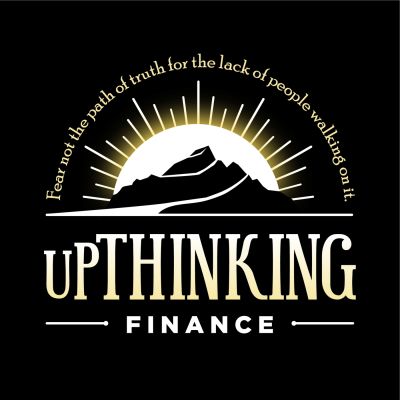A Podcast that offers a unique and discerning view of economics and financial planning Securities and Advisory services offered through LPL Financial. A registered investment advisor. Member FINRA & SIPC. The financial professionals associated with LPL Financial may discuss and/or transact business only with residents of the states in which they are properly registered or licensed. No offers may be made or accepted from any resident of any other state.
https://upthinking-finance.captivate.fm
episode 5: The BIG Mistake(s)
When people make small mistakes and deviations with their retirement portfolio, we can work through it. But there’s a BIG mistake that people make that not only destroys their financial future but also makes a generational impact. In this episode of Upthinking Finance™ I’ll share some stories about mistakes I’ve observed over the years. What’s the common thread? The role of emotion. Listen now to learn how to avoid these big mistakes.
You will want to hear this episode if you are interested in...- Why you don’t want your investments over-concentrated [2:47]
- Avoid excessive concentrations of stock from an employer [9:07]
- The role of fear in challenging markets [14:25]
- Why you can’t sell when you’re facing your deepest fears [19:07]
- Prepare by diversifying and building an actively managed investment plan [24:12]
Why you don’t want your investments over-concentrated
Over-concentration typically occurs because clients either work for companies and get compensated with stock options OR inherit stock from someone who passed away.
I met an individual in 2006 who had inherited some stock from a parent. We were just emerging from the tech bubble. This individual’s portfolio included well over 12,000 shares of Bank of America stock, valued at around $650,000. It also paid a dividend of over $30,000 a year. So there were financial reasons to want to keep the stock but the sentimental value was strong.
Anything that holds sentimental value is a tough hurdle for a financial advisor to overcome—and likely why I didn’t succeed in this situation. I recommended divesting a majority of the stock and only keeping a couple of hundred shares. Why? Because it was 60% of his net worth—a large chunk.
The plan was to reinvest and diversify his portfolio to reduce his concentration risk and bump up his income. But this individual held fast to his emotional connection and chose not to diversify. Two years later, the value of the stock dropped 90%. The $650,000 value tanked to $60,000.
Even worse, the dividend per share dropped from $2.52 a share to $0.04. His $30,000 income became $500 a year. Every positive that existed vanished. 13 years later, the value of this stock isn’t back to where it was. It’s hard to insert logic into emotional situations. If you find yourself in this situation, you have to detach yourself from the sentiment.
Avoid excessive concentrations of stock from an employerI was glad to see the dot-com era come and go. I had clients who expressed dissatisfaction with 25% returns when they thought they could have achieved 30–40%. One guy laughed at me when I told him he needed to diversify. People thought this era would never end.
At the time, NASDAQ had “pink sheets” for companies that weren’t big enough to be traded publicly (often referred to as penny stocks). I would get calls from people wanting to invest in companies that weren’t even on the pink sheets. Everyone was looking to invest in the next Microsoft.
I had a meeting with a client who worked for a company called Conexant, a spinoff of Rockwell International. Their stock price had gone up to over $130 in March of 2000. This gal had $1 million worth of stock options. I advised her to sell the majority of it and diversify her portfolio and retire successfully. But she was attached to the company. What happened?
As you can guess, in August 2020 the price fell below $30 and two private equity firms eventually bought the company at $2.40 per share. They filed for bankruptcy in 2013. Loyalty to any company—even one you work for—is a problem. Why? Corporate America isn’t loyal to anyone.
The role of fear in challenging marketsI learned that you need logic to offset fear. The logical anchor in a financial situation is a plan. You need a plan that is constantly and regularly reviewed. If an anchor isn’t in place, once the wind shifts, the ship is blown off course—and may even sink.
The Great Recession wasn’t just a recession. Financial Institutions were going under. The Dow Jones had peaked at over 14,000 in 2007. But over the next year-and-a-half, it dropped down to under 6,600. As financial institutions began to go bankrupt, people panicked. The media headlines only served to exasperate the fear.
These are just a few of the headlines:
- “Lehman Collapse Sends Shockwaves Around the World” – The New York Times?
- “Mounting Fears Shake World Markets as Banking Giants Rush to Raise Capital” – Wall Street Journal
- “Panic Grips Credit Markets” – Financial Times
None of this inspires anyone to stay the course, right? It inspires people to react. In this episode, I share stories of both success and failure. I share how you can prepare for the worst and avoid the big mistakes that many people make. Learn more by giving it a listen!
Securities and Advisory services offered through LPL Financial. A registered investment advisor. Member FINRA & SIPC.
The financial professionals associated with LPL Financial may discuss and/or transact business only with residents of the states in which they are properly registered or licensed. No offers may be made or accepted from any resident of any other state.
Resources & People Mentioned- Wall Street Journal: The Secret to Braving a Wild Market
- Movie: The Big Short
Connect with Emerson Fersch
- Capital Investment Advisers
- On LinkedIn
Subscribe to Upthinking Finance
